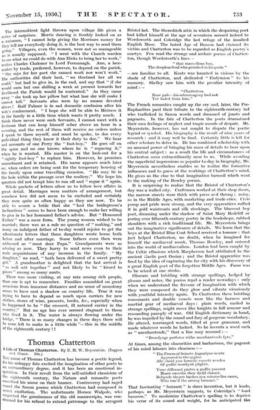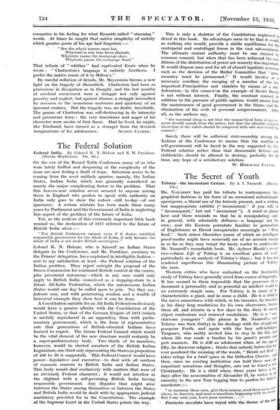Thomas Chatterton
A Lile of Thomas Chatterton. By E. H. W. Meyerstein. (Ingpon and Grant. 300 Tut name of Thomas Chatterton has become a poetic legend, for his unhappy fate excited the imagination of other poets to an extraordinary degree, and it has been an emotional in- spiration. In their revolt from the self-satisfied classicism of the eighteenth century, the Nature and romantic poets enseribed his name on their banner. Controversy had raged round the Saxon poems which Chatterton had composed in secret exultation. The unfortunate Horace Walpole, who suspected the genuineness of the old manuscripts, was con- demned for his refusal to extend patronage to, the arrogant
Bristol lad. The Shoreditch attic in which the despairing poet had killed himself at the age of seventeen seemed indeed to Wordsworth and Coleridge the last refuge of the insulted English Muse. The hated Age of Reason had claimed its victim and Chatterton was to be regarded as English poetry's martyr. Few read the strange and archaic poems of Chatter- ton, though Wordswortles lines-
" that marvellous boy,
The sleepless Soul who perished in his prido
—are familiar to all. Keats was haunted in visions by the shade of Chatterton, and dedicated " Endysnion " to his memory. Shelley saw him with the peculiar intensity of mind :—
"Chattert on Rose pale—his solemn agony had not Yet faded from him."
The French romantics caught up the cry and, later, the Pre- Raphaelites paid their tribute to the eighteenth-century lad who trafficked in Saxon words and dreamed of jousts and pageants. In the fate of Chatterton the poets dramatized their own feelings of neglect and tragic moods of despair. Mr. Meyerstein, however, has not sought to dispute the poetic legend or symbol. His biography is the result of nine years of research : and it may well be final. Certainly little is left for other scholars to delve in. He has combined scholarship with an unusual power of bringing his mass of details to bear upon his central subject : as a result the life and circumstances of Chatterton seem extraordinarily near to us. While avoiding the superficial impressions so popular to-day in biography, Mr. Meyerstein nevertheless enables us to realize the formative influences and to guess at the workings of Chatterton's mind. He gives us the clue to that imaginative turmoil which went to the making of the Rowley poems.
It is surprising to realize that the Bristol of Chatterton's day was a walled city. Craftsmen worked at their shop doors, the narrow streets were thick with press and throng ; noisy, as in the Middle Ages, with marketing and trade cries. Civic pomp and pride were strong, and the very apprentices ruffled it in gold waistcoats and silk stockings. The bluccoat boy poet, dreaming under the shadow of Saint Mary Redeliff or poring over fifteenth-century poetry in the bookshops, rubbed shoulders with a rich traditional life. Mr. Meyerstein brings out the imaginative significance of details. We learn that the boys at the Bristol Blue Coat School received a tonsure : that fact helped Chatterton, no doubt, when he Imagined for himself the mediaeval monk, Thomas Rowley, and entered into the world of mediaevalism. London had been caught by the Celtic effusions which Macpherson had attributed to the ancient Gaelic poet Ossian ; and the Bristol apprentice was fired by the idea of capturing the far city with his discovery of a great English poet of the forgotten Middle Ages. Fame was to be seized at one stroke.
Obscure and bristling with strange spellings, hedged by glosses and notes, the poems repel a reader nowadays : only when we understand the fervour of imagination with which they were composed do they glow and vibrate vicariously with youthful intensity again. To Chatterton these bristling consonants and double vowels were like the harness anti martial gear of mediaeval days : plain words, mailed in strange spellings, might move like knights in full armour and resounding panoply of war. Old English dictionary in hand, he was impelled by the sound and fury of gorgeous vocabulary. He altered, rearranged words, tilted at poor grammar, and made whatever words he lacked. So he invents a word such as " unenhantende," that a line may resound :— " Brondynge perforce wither unonhantende lyre."
At times, among the obscurities and barbarisms, the pageant of his mind labours into clearness :-
" The Freers of Seincto Augustyne next°
Appeared to the syghto Alpo eladd you homehie russett wcedes Of godlie monkysh plights.
Ynne diffraunt partes a godlie petunia Mesta sweetlie they dydd chaunt.
Behyndo theyre backes syx rninstrelles came, Who tun'd the strung bataunt."
That fascinating " bataunt " is sheer invention, but it leads, perhaps, as Mr. Meyerstein suggests, to Coleridge's " loud bassoon." To modernize Chatterton's spelling is to deprive his verse of its sound and weight, for he anticipated the
romantics in his feeling for what Rossetti called " stunning " words. At times he caught that native simplicity of melody which greater poets of his age had forgotten :-
" See the Whyte moone onne hie, Whyterre is mie true loves shroud°,
Whyterro yanne the momynge skye, Why-terre yanne the evenynge cloud."
That refrain of " whither " bad captivated Keats when he wrote : " Chatterton's language is entirely Northern. I prefer the native music of it to Milton's."
By careful collation of details, Mr. MeYerstein throws a new light on the tragedy at Shoreditch. Chatterton had been as precocious in dissipation as in thought, and the last months of cerebral excitement were a struggle not only against poverty and neglect, but against disease, a struggle intensified by recourse to the monstrous nostrums and quackery of an ignorant century. But the tragedy was, no doubt, inevitable: The genius of Chatterton was self-destroying in its intensity and premature force ; the very truculence and anger of his character were smoke of that flame. Had he lived, he might, like Rimbaud, have turned as a stranger from the feverish
imaginations of his adolescence. AUSTIN CLARKE.









































 Previous page
Previous page